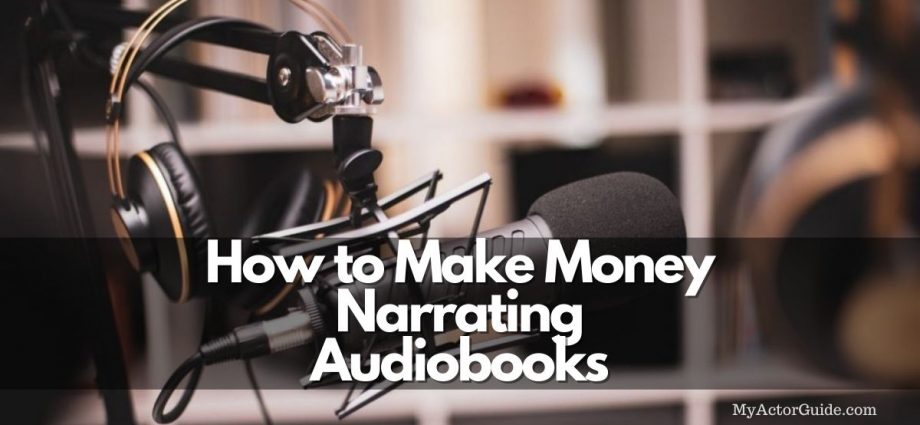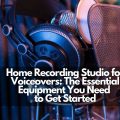This post may contain affiliate links, so I may receive a commission, at no cost to you, if you make a purchase through a link. Check out the disclosure for more info. And thank you for supporting free content!
Audiobooks are a fast growing market for for both publishers and voice actors alike. Long commute times, fatigue from reading 100 emails every day, and the fact that we all carry audiobook players, a.k.a. smartphones, in our pockets, makes for a golden combination: a hungry audience and easy access. Most actors are natural recording artists. If you’ve got a great voice, some acting talent and you’re at least a little bit tech savvy, or willing to learn, chances are you can earn a substantial income and even make a living narrating audiobooks and producing the content.
Here’s what you need to get started to make money narrating audiobooks.
Let’s Start With Voice
- Do you have a voice that people love to listen to?
- Do you know how to use your voice to convey emotions?
- Do you enjoy sitting and reading out loud for long periods of time?
If you answered yes to all three of these questions chances are you’re well on your way to becoming a great audiobook narrator. But of course, just having a pleasant voice is not enough. While acting training definitely helps, narrating audiobooks requires a number of different skills, both vocal and technical. And the vocal skills required really vary depending on the genre.
Non-fiction often requires the narrator to take dry text and bring it to life with energy and an appropriate amount of enthusiasm to hold a listener’s interest and attention. Fiction on the other hand may call for you to do half a dozen different voices as you read the dialogue, or change points of view. For children’s books, break out your playful side and try on those silly voices.
The big difference with narrating audiobooks as compared to other acting is that it’s pretty much a solo activity; you have to be okay spending long hours in a soundproof booth or maybe even in a sound treated corner of your dining room or bedroom, basically acting your little heart out into nothing more than a microphone, a headset and a computer.
Aside from having great vocal skills and being tech savvy, you’re also going to need a significant amount of patience! You have to be able to perform consistently, keep your voice even, while it the same time acting as your own audio engineer. And if you’ve ever read a line out loud, you know that mistakes happen; it’s easy to stumble, and you may need to do several takes to get a section, a paragraph or even a page right. As you listen to playback afterwards, there’s going to be the occasional “pick-up” as well to make changes or correct mistakes before finalizing the recording. This is where it’s really important to be able to match the recording levels, room tone, as well as the tone of your voice that you had in your original recording to the newly recorded section so it all blends smoothly.
An Overview of the Narration Process
When narrating from home you may be working with a production company, but most likely directly for the author or book publisher. This is where the business side comes in as you deal with deadlines, file delivery, milestones, and of course getting paid. Initially, most of your clients will probably be authors or small publishers, and you’ll be expected to do the post-production on your audio files and deliver a completely finished product, usually in ACX (Amazon Creative Exchange) format.
Preparation
Once you receive the text you’ll be narrating, there is a little bit of prep work like reading through the material, or at least skimming it, to familiarize yourself with the text, and if it’s fiction, to get to know the characters and establish the flow. This is also the time to decide on character voices, make note of any accents required or words that you’re not sure how to pronounce. In my personal experience, working on any recording project, this is always a good time to check in with whoever hired you. Verify all pronunciations before you begin working. Anytime I haven’t done this, and I mean every single time, it’s been a mistake! And I’ve had to record the whole thing over again.
Producer, Director, Audio Technician
Once you’re done the prep work, you’re all setup, working in a quiet place with good acoustics, it’s time to start recording. This is where you work that actor magic and bring the words to life with the appropriate levels of energy, a variety of voices if need, all of the correct pronunciations, and anything else you’ve set out in your pre-recording work. Good news / bad news: here you have full creative control because you’re functioning as your own director, producer and sound technician.
Break it Down
When recording long blocks of text, you’re always going to want to break this down into smaller, individual audio files, usually one chapter at a time – max! And if you’ve booked the job through ACX, you’re going to have to submit a 15 minute sample before continuing. Having smaller files really helps with post production and keeping everything clean and manageable.
Quiet Please
When recording from home, you need to make sure that you’re set up in a quiet place. In addition to sound dampening, not sound proofing, you’re probably going to have to turn off things like air conditioning and the refrigerator while recording. Both of these are two of the biggest noise culprits and can be shockingly loud on a sensitive mic. Also avoid being near windows or in a room that faces a major street. When you can, try to record at the time of day when there’s very little ambient noise inside and outside of your home.
NOTE: If you’re turning off the fridge, make sure to leave a fail-safe reminder for yourself to turn it back on! I once worked with a sound guy on a TV show when we were filming on-location in someone’s home, and he put his car keys in the fridge so he literally couldn’t leave without going back to it. (The production company having to replace the entire contents of someone’s fridge and freezer just one time was all it took to etch this into his brain!) Personally, I put a chair in front of the fridge when it’s off; big, unmistakable and definitely reminds me to turn it back on!
A Word About Wardrobe
Something that is often overlooked is the need to wear quiet clothing. You may not think much about this, but jewelry, such as earrings or bracelets can make a lot of noise! Other things that can make noise are harsh fabrics like nylon track pants or windbreakers. Jeans and T-shirts are perfect for recording. Whenever there is any source of noise that you have control over, make sure you use that power to minimize it!
How Much Does It Pay?
There’s no simple answer to how much you can make narrating audiobooks; job rates fluctuate hugely among various platforms as well as the size of the project and the narrator’s skillset. It’s important to note that project rates are paid “per finished hour”, meaning per audiobook hour, not however long it took you to record and produce that. Each finished hour may take several hours of recording, rerecording, editing, and finalizing to deliver. Royalty-sharing options when it comes to audiobook jobs aren’t always that great unless the audiobook becomes a runaway success. At the same time, don’t underestimate the power of a little passive income. This should be decided on a project to project basis as well as your own skills and experience level. Depending on the project and rates you negotiate, you could make anywhere between $100 per finished hour to several hundred per finished hour. There is also a big difference between union and non-union rates. ACX and UpWork can be great sources to research this more.
If you still think this is something you might want to do, or maybe are definitely interested in, you are also going to need specialized recording equipment.
You can read more on how to set up your home recording studio and equipment needed, as well as my personal recommendation here.
Audiobooks narrating is a really unique profession, as well as a unique skill set and interest. Personally, to be honest with you I just don’t have the patience! Having said that, I have several friends who completely love doing it! The upside: it is something that you can make really decent money at, do it from your own home and on your own schedule, all of those things a huge plus!
Are you and audiobook narrator with some tips to share? Or maybe you have questions?
Head to the comments and tell me more, then pin and share this post if it helped you!
* Please Note: I am not an agent, manager, or casting director. I do not procure work for actors. All information, workshops and coaching are for educational purposes only and are not a guarantee or promise of employment. Thank you for being here!






I randomly happened upon your post and I’m so glad I did. I’ve long considered voicing audio books, but for whatever reason just haven’t put myself out there. Reading your advice I’ve decided to finally give it a try. Thanks!
YAY!!! I’m so glad you did! Be sure to jump on the mailing list… I’ll be offering a couple of VO classes soon! 🙂 Hunter